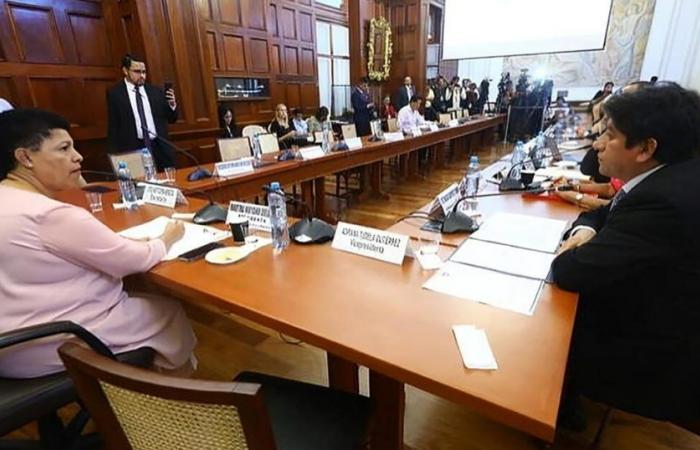
The temporary failure of Congress to eliminate the National Board of Justice (JNJ) and in the proposal to fill it with low-qualified substitutes, it focuses on the public competition underway for the election of its new magistrates. And in the middle of that, he proposes a proposal that would put meritocracy at risk.
The Ombudsman and president of the Special Commission for the new JNJJosué Gutiérrez, overtook The Republic which will propose that there be no limits on substitutes in the new composition of this institution in charge of electing, sanctioning and ratifying judges and prosecutors.
“In the future, I would like that when they talk about replacements they do not set limits when they have complied with the reports and are suitable to be promoted in the order of priority and that we cannot speak in a pejorative way,” he told this newspaper.
It’s not the first time he’s tried it. In the legislature that ended on June 15, Gutiérrez had proposed modifying the organic law of the JNJ so that former candidates with low scores could be substitutes and could replace the magistrates. Ines Tello and Aldo Vasquez. The Constitution Commission, chaired by Fujimori Martha Moyano, accelerated the approval of a ruling to prevent the return of Tello and Vásquez.
The proposal was put on the Plenary agenda, but at the close of the legislature it was not voted on. The Permanent Commission remained with the power to approve laws. However, the congresswoman of Cambio Democrático, Ruth Luque, specifies that they will not be able to give the green light to a modification to the organic law of the JNJ or to eliminate this institution.
In this context, Gutiérrez announced that in the new legislature he will seek to have the Constitution Commission approve a law that does not put limits on substitutes in the JNJ. The Constitution establishes that there are seven regular members and the organic law provides for seven substitutes.
“We would like there to be coherence in the course of the next legislature and we will talk with whoever assumes the presidency of the Constitution Commission in order to ask them if they are going to see this issue in such a way that as a Special Commission we can raise it,” he stated to this diary.
It is imminent that for the next legislature the Constitution Commission will continue to be the bastion of Fujimorism, where counter-reforms are plotted in favor of this Congress.
The president of the Special Commission will present the schedule of the public tender for the new JNJ on June 24 and projects that this process will end in October. There will be training in November and inductions in December. The new stage begins in January.
The problem, according to lawyer Heber Campos, is that modifying the organic law to not establish a limit on substitutes is not in line with the meritocratic nature that this contest should have.
“The idea is that the contest is meritocratic. That is, it allows the best to access planned places. If all those who compete, technically, can access the JNJ, then, of course, this meritocratic element loses meaning,” he said.
Campos adds that, in any case, if such a change is approved in Congress, it should not have an effect on a public tender for the JNJ that the defender has already called. “It could not take effect retroactively. If it is called, it is assumed that the rules in force during the contest are those that will be maintained throughout its development,” he reflected.
Electoral authorities pending election
The defender alleges that his proposal is to address the problem of the JNJ’s lack of quorum. The concrete thing is that this controversy was caused by Congress when it disqualified Tello and Vásquez. On June 19, the deadline for the First Constitutional Chamber to resolve the protection action of both expires.
If the ruling for Tello and Vásquez is in favor, Congress will not sit idly by. The president of the Special Commission himself emphasizes that the Constitutional Court (TC) would also have to rule, given that there is a conflict of jurisdiction between the Judicial Branch (PJ) and the Legislative Branch in this case.
If they are restored, the board will have a full quorum and will be able to elect the new heads of the company without any problem. ONPE and of Reniec. Otherwise, there is the possibility that it will be a new composition that does it. And Congress’s interest in having influence over the electoral system is known.
Avoid opposing the creation of the School of Judiciary
The president of the Special Commission for the new JNJ, Josué Gutiérrez, does not reject the creation of the National School of Judiciary. “I agree with any system that is established to strengthen meritocracy and is depoliticized. Whatever the exit, in good time. And we must privilege the autonomy of the Judiciary and the Public Ministry.” The elimination of the JNJ to create this school is a constitutional reform that could not be carried out in the previous legislature. However, the project is still on.





